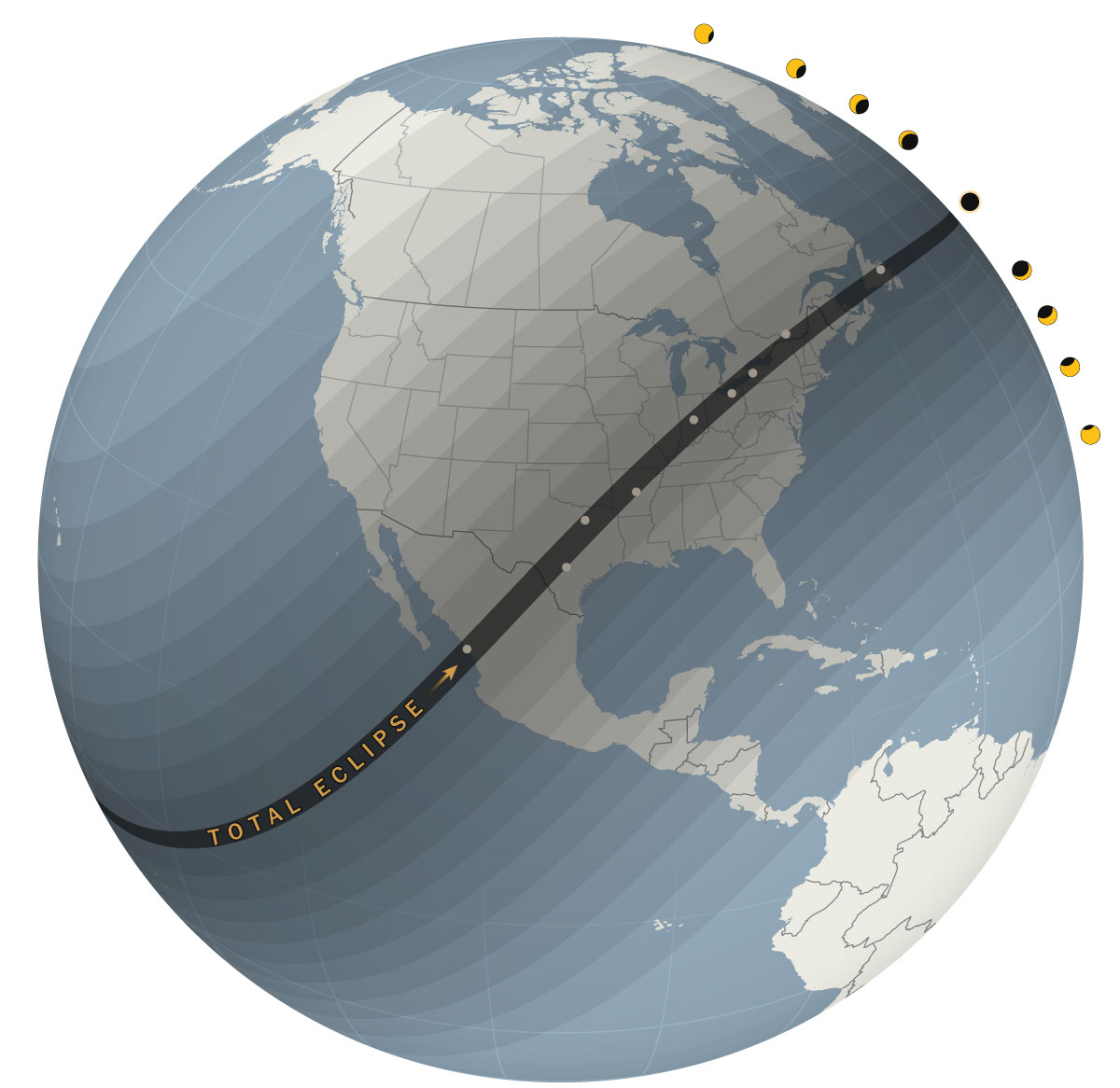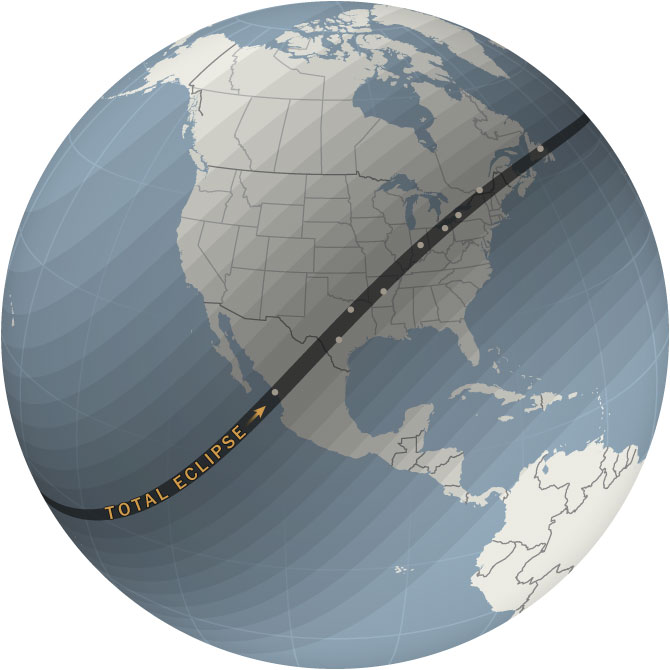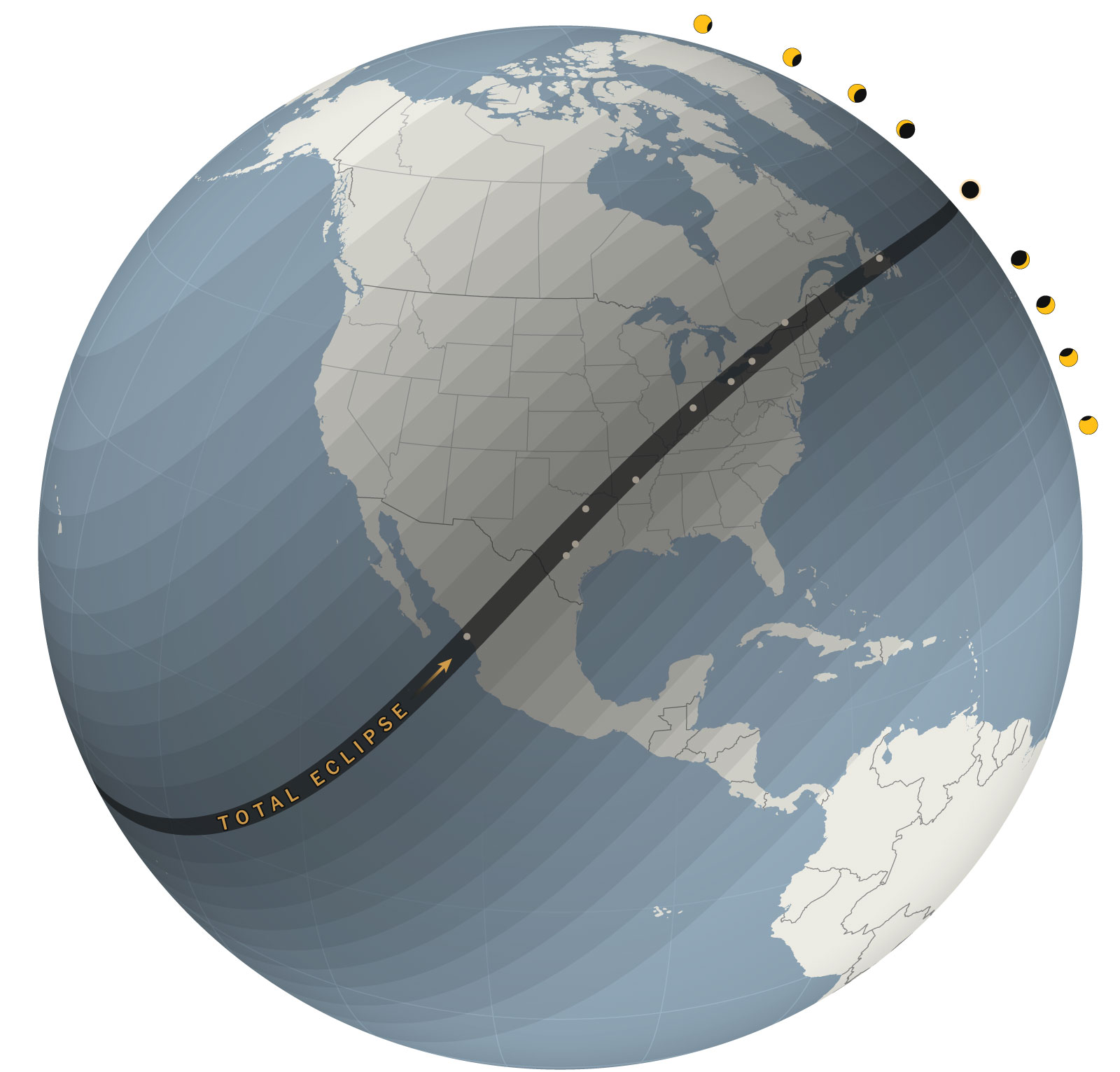The rendezvous between the sun and the moon in 2017 captivated a small region in the Midwest. Lucky for Americans at the eclipse crossroads, they get to see it again.
It is rare for a total solar eclipse to hit the same place twice — once every 366 years on average. In 2019, this happened in the Pacific Ocean, far west of the coast of Chile. By a stroke of luck, the next one will span a region of about 10,000 square miles that includes parts of southern Illinois, southeastern Missouri and western Kentucky.
People in those areas will encounter April 8’s eclipse about seven years after they were near the middle of the path of the “Great American Eclipse.”
For that total eclipse, which occurred on Aug. 21, 2017, Southern Illinois University sold out its football stadium in the city of Carbondale.
“We had people screaming,” said Bob Baer, the director of the university’s astronomy observation program. “But unlike a football game, you had them all screaming for the same thing.”
The college town, with a population of nearly 22,000, was among the most popular hot spots in the Midwest for the 2017 eclipse. Now, Carbondale and its neighbors are getting ready for another day with no sun. While towns in the area averaged around two and half minutes in the darkness of totality in 2017, this time they will experience about four minutes of totality. Preparation and hype have increased, too.
Mr. Baer first heard that Carbondale, five hours south of Chicago, was in the crossroads of two solar eclipses nearly a decade before the 2017 event. But the significance didn’t click for him until 2014, when an astronomer from the National Solar Observatory reached out.
The Path of the Eclipse
On April 8, a total solar eclipse will cross North America from Mazatlán, Mexico, to the Newfoundland coast near Gander, Canada. Viewers outside the path of the total eclipse will see a partial eclipse, if the sky is clear.
#g-globe-box {
max-width:800pxpx;
}
#g-globe-box ,
#g-globe-box .g-artboard {
margin:0 auto;
}
#g-globe-box p {
margin:0;
}
#g-globe-box .g-aiAbs {
position:absolute;
}
#g-globe-box .g-aiImg {
position:absolute;
top:0;
display:block;
width:100% !important;
}
#g-globe-box .g-aiSymbol {
position: absolute;
box-sizing: border-box;
}
#g-globe-box .g-aiPointText p { white-space: nowrap; }
#g-globe-800 {
position:relative;
overflow:hidden;
}
#g-globe-800 p {
font-family:nyt-franklin,arial,helvetica,sans-serif;
font-weight:300;
line-height:17px;
height:auto;
opacity:1;
letter-spacing:0em;
font-size:15px;
text-align:left;
color:rgb(51,51,51);
top:1.2px;
position:static;
text-transform:none;
padding-bottom:0;
padding-top:0;
mix-blend-mode:normal;
font-style:normal;
}
#g-globe-800 .g-pstyle0 {
line-height:6px;
height:6px;
font-size:12px;
top:1px;
position:relative;
}
#g-globe-800 .g-pstyle1 {
height:17px;
text-align:right;
position:relative;
}
#g-globe-800 .g-pstyle2 {
font-weight:600;
line-height:6px;
height:6px;
font-size:12px;
top:1px;
position:relative;
}
#g-globe-800 .g-pstyle3 {
font-weight:700;
line-height:6px;
height:6px;
font-size:12px;
top:1px;
position:relative;
}
#g-globe-800 .g-pstyle4 {
line-height:14px;
height:14px;
font-size:16px;
text-align:center;
color:rgb(221,221,221);
top:1.3px;
position:relative;
}
#g-globe-800 .g-pstyle5 {
line-height:15px;
height:15px;
letter-spacing:0.17em;
font-size:13px;
text-align:center;
color:rgb(221,221,221);
top:1px;
position:relative;
}
#g-globe-800 .g-pstyle6 {
line-height:14px;
height:14px;
font-size:16px;
text-align:right;
color:rgb(221,221,221);
top:1.3px;
position:relative;
}
#g-globe-800 .g-pstyle7 {
line-height:14px;
height:14px;
font-size:16px;
color:rgb(221,221,221);
top:1.3px;
position:relative;
}
#g-globe-800 .g-pstyle8 {
font-family:nyt-cheltenham,georgia,serif;
font-style:italic;
line-height:16px;
height:16px;
letter-spacing:0.09em;
font-size:14px;
text-align:center;
color:rgb(153,177,195);
}
#g-globe-600 {
position:relative;
overflow:hidden;
}
#g-globe-600 p {
font-family:nyt-franklin,arial,helvetica,sans-serif;
font-weight:300;
line-height:15px;
height:auto;
opacity:1;
letter-spacing:0em;
font-size:13px;
text-align:left;
color:rgb(51,51,51);
top:1px;
position:static;
text-transform:none;
padding-bottom:0;
padding-top:0;
mix-blend-mode:normal;
font-style:normal;
}
#g-globe-600 .g-pstyle0 {
height:15px;
text-align:right;
position:relative;
}
#g-globe-600 .g-pstyle1 {
line-height:4px;
height:4px;
font-size:11px;
top:0.9px;
position:relative;
}
#g-globe-600 .g-pstyle2 {
font-weight:600;
line-height:4px;
height:4px;
font-size:11px;
top:0.9px;
position:relative;
}
#g-globe-600 .g-pstyle3 {
font-weight:700;
line-height:4px;
height:4px;
font-size:11px;
top:0.9px;
position:relative;
}
#g-globe-600 .g-pstyle4 {
line-height:18px;
height:18px;
font-size:15px;
text-align:center;
color:rgb(221,221,221);
top:1.2px;
position:relative;
}
#g-globe-600 .g-pstyle5 {
line-height:16px;
height:16px;
letter-spacing:0.17em;
text-align:center;
color:rgb(221,221,221);
position:relative;
}
#g-globe-600 .g-pstyle6 {
line-height:18px;
height:18px;
font-size:15px;
text-align:right;
color:rgb(221,221,221);
top:1.2px;
position:relative;
}
#g-globe-600 .g-pstyle7 {
line-height:18px;
height:18px;
font-size:15px;
color:rgb(221,221,221);
top:1.2px;
position:relative;
}
#g-globe-600 .g-pstyle8 {
font-family:nyt-cheltenham,georgia,serif;
font-style:italic;
line-height:14px;
height:14px;
letter-spacing:0.09em;
font-size:12px;
text-align:center;
color:rgb(153,177,195);
}
#g-globe-335 {
position:relative;
overflow:hidden;
}
#g-globe-335 p {
font-family:nyt-franklin,arial,helvetica,sans-serif;
font-weight:300;
line-height:11px;
height:auto;
opacity:1;
letter-spacing:0em;
font-size:12px;
text-align:left;
color:rgb(221,221,221);
top:1px;
position:static;
text-transform:none;
padding-bottom:0;
padding-top:0;
mix-blend-mode:normal;
font-style:normal;
}
#g-globe-335 .g-pstyle0 {
height:11px;
text-align:center;
position:relative;
}
#g-globe-335 .g-pstyle1 {
line-height:13px;
height:13px;
letter-spacing:0.17em;
font-size:11px;
text-align:center;
top:0.9px;
position:relative;
}
#g-globe-335 .g-pstyle2 {
height:11px;
position:relative;
}
#g-globe-335 .g-pstyle3 {
height:11px;
text-align:right;
position:relative;
}
#g-globe-335 .g-pstyle4 {
font-family:nyt-cheltenham,georgia,serif;
font-style:italic;
line-height:14px;
height:14px;
letter-spacing:0.09em;
font-size:11px;
text-align:center;
color:rgb(153,177,195);
}
10%
30%
50%
70%
100%
Gander
70%
CANADA
50%
Montreal
Buffalo
30%
UNITED
STATES
Cleveland
10%
Atlantic
Ocean
Indianapolis
Dallas
Little Rock
Austin
San Antonio
Pacific
Ocean
Mazatlán
MEXICO

10%
30%
50%
70%
100%
Gander
70%
CANADA
50%
Montreal
30%
Buffalo
UNITED
STATES
Cleveland
10%
Indianapolis
Atlantic
Ocean
Dallas
Little Rock
San Antonio
Pacific
Ocean
Mazatlán
MEXICO

Gander
CANADA
Montreal
Buffalo
UNITED
STATES
Cleveland
Indianapolis
Atlantic
Ocean
Dallas
Little Rock
San Antonio
Pacific
Ocean
Mazatlán
MEXICO
